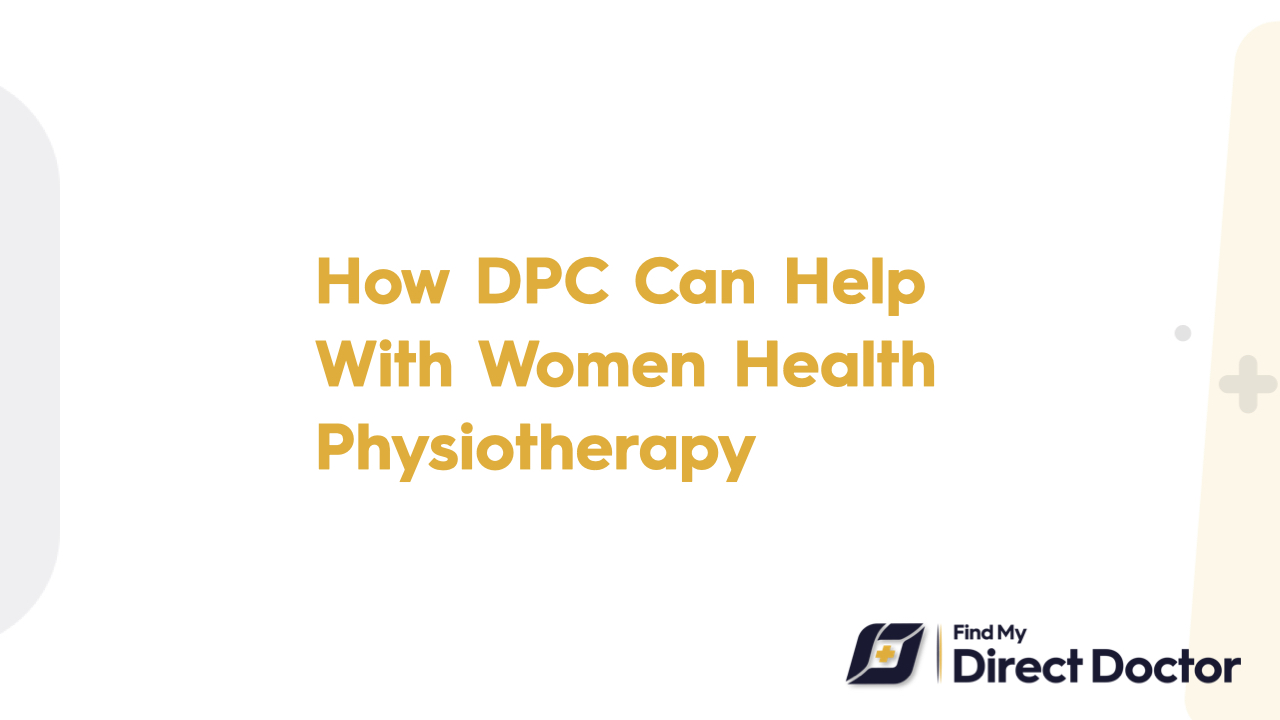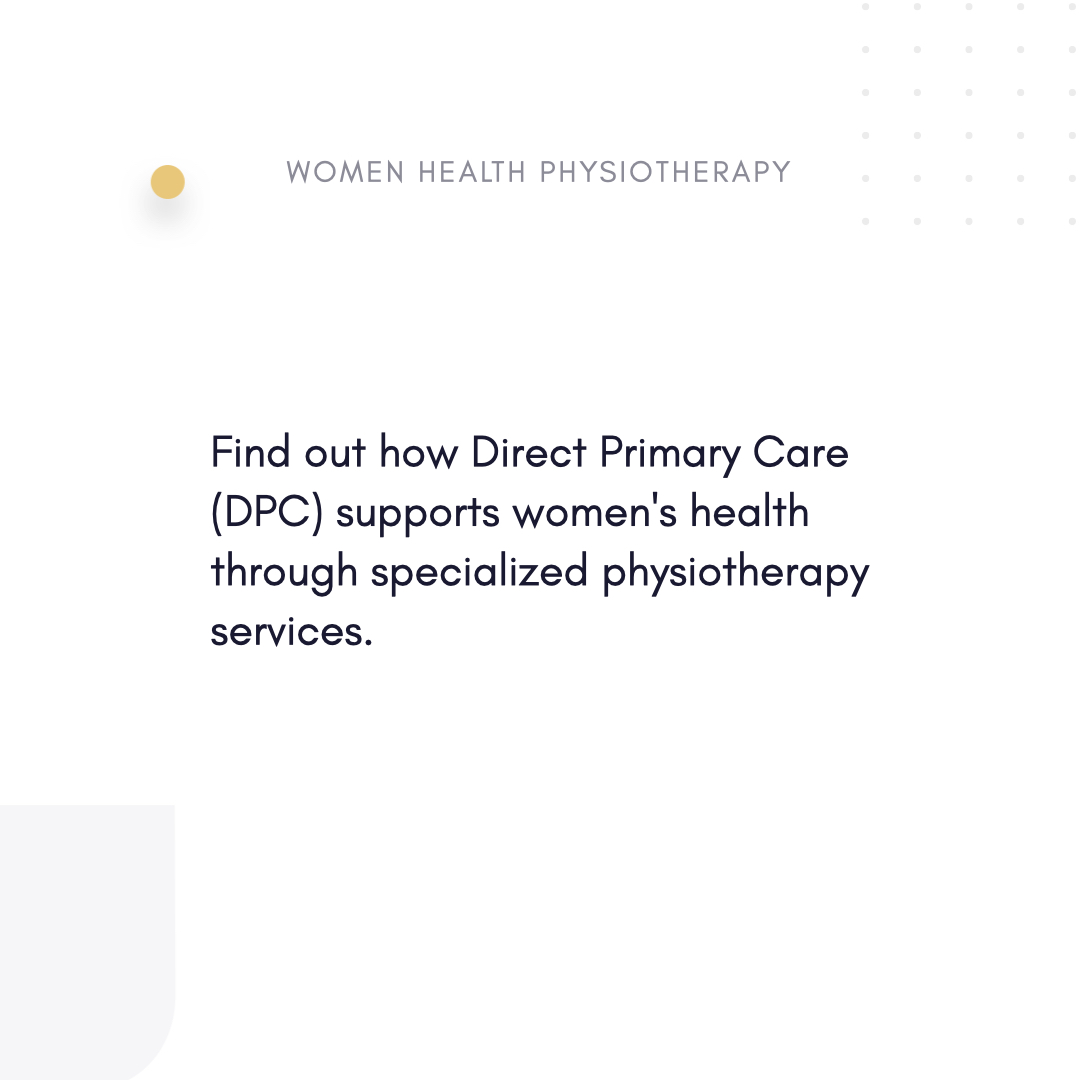



Physiotherapy for women's health focuses on addressing the specific musculoskeletal and pelvic health needs of women throughout their lives. Women's health physiotherapy plays a crucial role in promoting optimal health and well-being, from pregnancy and childbirth to menopause and beyond. In addition to providing valuable support and resources to women undergoing physiotherapy for a variety of women's health conditions, Direct Primary Care (DPC) facilitates personalized care and enhances the overall treatment process.

Comprehensive Assessment and Treatment Planning:
DPC providers conduct thorough assessments to understand the specific musculoskeletal and pelvic health concerns of women seeking physiotherapy. Each patient receives an individualized treatment plan tailored to their needs and goals in collaboration with women's health physiotherapists.
Access to Specialized Women's Health Physiotherapy Services:
DPC offers specialized women's health physiotherapy services, including treatment for pelvic floor dysfunction, prenatal and postnatal care, urinary incontinence management, and rehabilitation following gynecological procedures. These services address a wide range of women's health concerns and support women throughout different life stages.
Pelvic Floor Rehabilitation and Strengthening:
As part of women's health physiotherapy, pelvic floor rehabilitation and strengthening exercises are often prescribed to address pelvic floor dysfunction, including urinary incontinence, pelvic organ prolapse, and pelvic pain. In order to improve pelvic floor function and alleviate symptoms, DPC providers work closely with physiotherapists to prescribe targeted exercises and techniques.
Preparation for Pregnancy, Labor, and Birth:
To optimize musculoskeletal and pelvic health for women preparing for pregnancy, DPC provides preconception counseling and support. Women's health physiotherapy during pregnancy helps women prepare for labor and birth by addressing pelvic pain, back pain, and pelvic floor weakness.
Postnatal Rehabilitation and Recovery:
A woman's musculoskeletal and pelvic health may be affected after childbirth and require rehabilitation and support. In collaboration with physiotherapists, DPC providers offer postnatal rehabilitation programs that promote overall recovery and well-being, address abdominal separation (diastasis recti), and restore pelvic floor function.
Management of Menopausal Symptoms:
There can be changes in pelvic floor function, bone health, and musculoskeletal strength during menopause. Physiotherapy for women can help manage menopausal symptoms and promote musculoskeletal health during this transitional period. Women can navigate menopause with confidence and comfort when they receive support and resources from DPC providers.

Initial Assessment and Treatment Planning:
Women undergoing women's health physiotherapy receive an initial assessment with their DPC provider and physiotherapist to assess their musculoskeletal and pelvic health concerns. Based on their symptoms, preferences, and goals, they develop a customized treatment plan.
Pelvic Floor Assessment and Rehabilitation:
Women's health physiotherapy often includes pelvic floor assessment and rehabilitation to address pelvic floor dysfunction. A pelvic floor assessment, pelvic floor exercises, and education on proper pelvic floor function are conducted by DPC providers and physiotherapists in conjunction with each other.
Prenatal and Postnatal Care:
Pregnant women can receive prenatal care and support from DPC providers, including advice on exercise, nutrition, and musculoskeletal health. To help women recover and adjust to motherhood after childbirth, they receive postnatal care that addresses musculoskeletal and pelvic health issues.
Education and Empowerment:
In women's health physiotherapy, patients are educated and empowered, enabling them to manage their musculoskeletal and pelvic health in an active way. Women are educated about their bodies, pelvic floor function, and strategies to maintain optimal health and well-being by DPC providers and physiotherapists.
Continuous Monitoring and Support:
In addition to providing ongoing support and encouragement, DPC providers monitor patients' progress throughout the course of women's health physiotherapy. By providing support and empowerment, they ensure women are able to achieve their musculoskeletal and pelvic health goals.